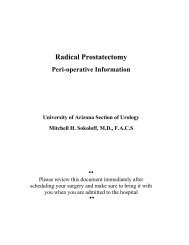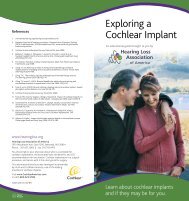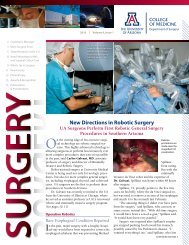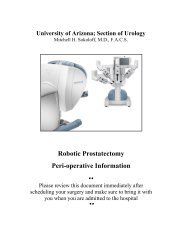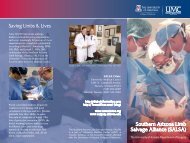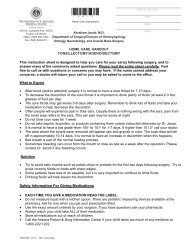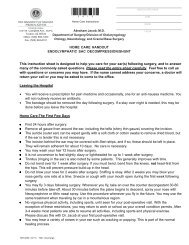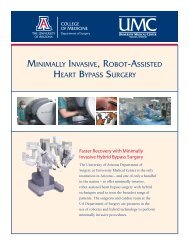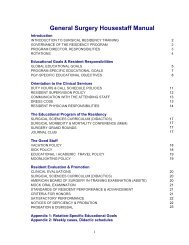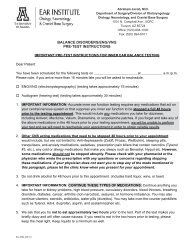Volume 10, Issue 1, 2011-2012 - Department of Surgery - University ...
Volume 10, Issue 1, 2011-2012 - Department of Surgery - University ...
Volume 10, Issue 1, 2011-2012 - Department of Surgery - University ...
- No tags were found...
Create successful ePaper yourself
Turn your PDF publications into a flip-book with our unique Google optimized e-Paper software.
Athens-Geneva-Tucson ProjectKlearchos K. Papas, PhD, and his team are joining in an internationaleffort to expand islet transplants to patients in Europe with brittle diabetesmellitus.In what is known as the Athens-Geneva-Tucson Project, the UA is sendingtheir new tools, technologies, and staff to aid in an effort to bring islet transplantationto Athens.Theodore Karatzas, MD, a surgeon from Athens, hoped to provide islettransplants to his critically ill diabetic patients in Greece. However, Greece doesnot have an islet cell transplant center, which would cost millions <strong>of</strong> dollars tobuild and operate.Geneva has a very active and highly successful islet transplant program.Dr. Karatzas entered into an agreement with Dr. Thierry Berney, MD, whodirects the program at the <strong>University</strong> <strong>of</strong> Geneva, that when a donated pancreasbecomes available in Greece, it would be flown to Geneva, where the islet cellswould be isolated and flown back to Athens for transplantation.Twice an attempt was made, but twice the islet cells were <strong>of</strong> insufficientnumbers and quality after isolation in Geneva for a successful transplant, presumablybecause it took too long to get the pancreas to Geneva.Drs. Papas, Karatzas, and Berneyhave teamed up and are expected to usethe new technologies and tools to makeislet transplantation a reality in Athens.Technologies developed by Dr. Papasand his team, thanks to funds fromthe National Institutes <strong>of</strong> Health andJuvenile Diabetes Research Foundation,can better preserve the pancreas, transferislets more safely, and determine ifthe cells are viable before transplantation.A highly trained UA team is aidingin the project. Bill Scott, who is gettinghis PhD in biomedical engineering, willbe in Athens; he will board an airplanewith the equipment and the organ andCollege in London to determine whetherpersufflation can extend the viability<strong>of</strong> pancreata from donors after cardiacdeath. They also are examining whetherit could expand the viability <strong>of</strong> organs indonors over age 50.“The early data is very promising,’’Dr. Papas said.UA researchers test the persufflation device inthe U.S. in preparation for the Athens-Genevaproject.fly to Geneva. Kate Mueller, a UA research specialist, will be stationed in Genevaand will evaluate the islets. She will place them in specialized culture containersand fly with them back to Athens, where she will reevaluate them to determineif they remain viable for transplantation.The new technologies developed by Dr. Papas and his team are improvingeach step in the process, with the hope <strong>of</strong> successful long-distance transplantation.The goal is to create centers that can provide transplants using organsfrom thousands <strong>of</strong> miles away, expanding the number <strong>of</strong> successful proceduresthroughout the world.“The successfuldevelopment <strong>of</strong>this technologywill help savelives by increasingthe number<strong>of</strong> patientsreceiving transplants.”– Horacio Rilo, MDIslet Transplants at UAIslet autotransplants (self-donated)currently are performed at The <strong>University</strong><strong>of</strong> Arizona Medical Center to treatchronic pancreatitis. The UA <strong>Department</strong><strong>of</strong> <strong>Surgery</strong> Comprehensive Center forChronic Pancreatitis, in conjunctionwith the Institute for Cellular Transplantation,under the direction <strong>of</strong> HoracioRilo, MD, has performed 30 isletautotransplants to date. The UA hopesto begin islet allotransplants for patientssuffering with type 1 diabetes mellitusin <strong>2012</strong>.Islet transplants to treat patientswith type 1 diabetes mellitus are currentlyin Phase 3 clinical trials in the U.S.,sponsored by the National Institutes<strong>of</strong> Health.“The number <strong>of</strong> patients needingand waiting for a lifesaving transplantfar outpaces the supply <strong>of</strong> availableorgans,” said Dr. Rilo. “The successfuldevelopment <strong>of</strong> this technology will helpsave lives by increasing the number <strong>of</strong>patients receiving transplants.”Rainer W.G. Gruessner, MD, chief<strong>of</strong> the Division <strong>of</strong> Abdominal Transplantationand chairman, UA <strong>Department</strong><strong>of</strong> <strong>Surgery</strong>, added, “Both islet allotransplantsand pancreas transplants havebeen shown to be successful options forpatients with diabetes mellitus and itsadvanced secondary complications,such as metabolic control problems,end-stage renal disease, neuropathy,and gastropathy.“While results for pancreas transplantshave beensteadily improvingover the pastfour decades, withone-year patientsurvival rates <strong>of</strong>more than 95 percentand one-yeargraft survival rates<strong>of</strong> more than 80percent, the results<strong>of</strong> islet transplantscontinue to trailthose <strong>of</strong> pancreastransplants,” Dr. Gruessner said.“Emphasizing islet allotransplants asa research focus within the UA <strong>Department</strong><strong>of</strong> <strong>Surgery</strong> will establish the departmentas a national and internationalleader in transplant options for patientswith insulin-dependent diabetesmellitus.”9




